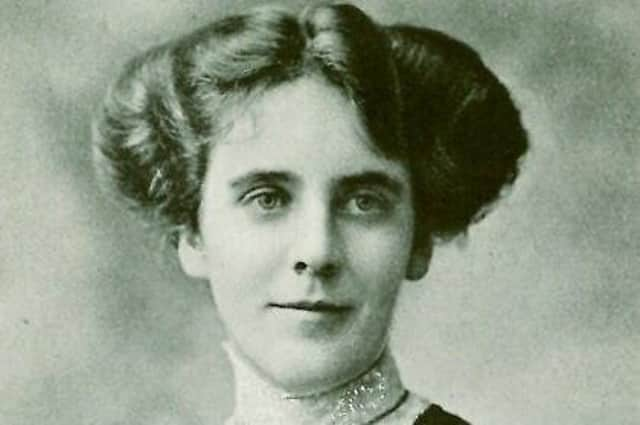Ida Mitchell, medical missionary to China whose brief life left a lasting legacy


Between 1869 and 1951, 91 Irish Presbyterian missionaries worked in Manchuria. Thirty-one of these were ordained. Forty-nine were female. Twenty-five were medically qualified.
They cooperated closely with missionaries from the United Free Church of Scotland and the Danish Lutheran Church.
Advertisement
Hide AdAdvertisement
Hide AdDespite many trials and tribulations, the efforts of these Presbyterian missionaries continue to bear fruit to this day. Many of the congregations started by PCI missionaries are now flourishing with, in some cases, membership numbering several thousands.
Isabel Mitchell was born in 1879. An Ulster-Scot, she was the daughter of the Rev D K Mitchell, the minister of Crumlin Road Presbyterian Church, and his Scottish-born wife.
Isabel (Ida to her family) grew up in a home which predisposed her to a life devoted to evangelical outreach. David, her brother, became a minister and served as a chaplain with the 36th (Ulster) Division during the Great War. Her sister Janie married a missionary, and another sister married a local clergyman.
In 1897, just before she was about to go to university, Ida heard Mrs Sara Greig, wife of Dr James Greig, a PCI medical missionary who served in Manchuria between 1889 and 1926, give a talk about missionary work in that country. The lecture had a profound impact on Ida and inspired her to study medicine and to go to China as a medical missionary.
Advertisement
Hide AdAdvertisement
Hide AdAfter a faltering start, Isabel became an outstanding student and graduated from Glasgow University in July 1903, having won four medals and two prizes during her university career.
The Russo-Japanese War of 1904-5 delayed her departure to Manchuria but during this period she worked as a house-surgeon in Manchester and taught Sunday School and helped in a Girls’ Club.
On November 12 1905 she arrived in Fukumen where she worked alongside the Rev and Mrs Fred O’Neill and Miss Sara McWilliams.
Ida was instrumental in opening a new women’s hospital in Fukumen which opened on October 16 1909. Annie O’Neill, a granddaughter of the Rev and Mrs Fred O’Neill, has described it as ‘the first modern hospital’ in Fukumen.
Advertisement
Hide AdAdvertisement
Hide AdIda was an excellent doctor and her reputation spread far and wide. In 1910 she returned home on a year’s furlough but ill health delayed her planned return. (The Presbyterian Historical Society of Ireland, based in Assembly Buildings, Fisherwick Place, Belfast, holds her visa issued by the Consul General in Muckden in July 1910 permitting her to travel to London via Siberia.) The exact nature of her illness is unknown, but she underwent an operation in Glasgow in early 1912. To the surprise of many and to her own delight, she received medical permission to return to China in the autumn of 1912.
Ida possessed an iron will but a frail body. As a child she had not been robust. Her fragile health may well have been permanently undermined by her strenuous efforts in the years before the Great War.
On March 16 1917 she complained of being tired. The next day she had a sore throat and was subsequently diagnosed as having diphtheria. She was expected to make a full recovery but she died on March 23.
At her funeral service Elder Shang, a local Christian leader, said: ‘Our doctor has given her life for us. For 12 years she has been at the call of anyone who suffered. She was like a man in her strength and rose at any hour of the night or day to help us. Her name is known and revered through all this country.’
Advertisement
Hide AdAdvertisement
Hide AdElder Shang acknowledged her contribution to the life of the church and expressed their sorrow at her passing but observed that ‘her work was done, and as a grain of wheat must fall into the ground and die, so she who did so much by her life, will do even more by her death, and we must bow to God’s will.’
She was buried at Kirin, the home of her sister Janie, who was married to Rev James McWhirter, another PCI missionary whose home church was also Crumlin Road and who served in China between 1908 and 1945.
Ida’s letters home to her mother and her poetry are preserved in an edited collection compiled by F W S O’Neill entitled ‘Dr Isabel Mitchell of Manchuria’ (James Clarke & Co, London, 1917).
The editor acknowledged the guidance of Helen Waddell in preparing the book for publication. (A copy may be consulted in the Library and Archive of the Presbyterian Historical Society.)
Advertisement
Hide AdAdvertisement
Hide AdOn her arrival in Manchuria the sheer scale of the task before her was daunting. Her mission field covered 5,000 square miles and had a population of 500,000, only 1,300 of whom were Christian.
Occasionally she was almost overwhelmed by it all: ‘It gives me a terrible hopeless feeling just to see it all, and to think what a tiny, tiny speck the Christians are in the midst of millions who are busy worshipping idols.’
Yet, she persevered, believing passionately in the importance of the work in which she was engaged.
In 1915 she set herself the goal of the eradication of tuberculosis because it claimed the lives of many Chinese people, two million in 1914 alone. To do so, she sought to train girls to help her.
Advertisement
Hide AdAdvertisement
Hide AdBy the time of her death, she had established a new hospital (as already noted) and dispensary, and trained six Chinese women as dispensary assistants. Had she lived longer, she would have trained many more.
Although Ida Mitchell’s career in Manchuria was unfortunately brief, she managed through her Christian witness, care and compassion and Ulster-Scots determination to transform the lives of countless young women and girls.